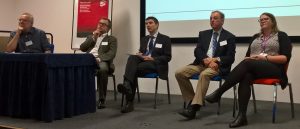SuperSolar and the Low Carbon Energy for Development Network (LCEDN) hosted a workshop on 9th May 2019 at Loughborough University, exploring Opportunities for Solar in the Developing World.
The workshop presented an exciting opportunity to bring together those working in solar applications across the developing world, in both grid and off-grid contexts, with the UK research and innovation community working on the latest developments in solar PV materials and production techniques that have potential application in developing communities.
The workshop attracted 50 attendees from academia and industry, with delegates from the international development community gaining an opportunity to hear about the technical focus of current PV research at an early stage, and for such researchers to understand the driving factors for those engaged in developing technologies for international markets.
The workshop opened by highlighting the broad challenges and opportunities for solar in the developing world, then reviewing potential funding opportunities and finance models for those engaged in the field, before presenting a selection of the latest research developments. The workshop closed with a panel discussion where all attendees could put forward their ideas, share experience and offer feedback to funders offering significant current and future opportunities for collaboration with developing countries in the field of low-carbon energy technologies.

Review of Challenges and Opportunities for Solar in the Developing World
Prof. Ed Brown introduced LCEDN as a platform for academics, practitioners, policy-makers and private sector organisations to interact and cooperate on research for low-carbon development in developing countries, and highlighted energy for international development as an area of major interest to DFID within the Transforming Energy Access programme, UKRI through the Global Challenges Research Fund, and Innovate UK through the Energy Catalyst programme.
Prof. Mike Walls, Director of the SuperSolar Network+, set out the economic, social and cultural drivers for solar power in the developing world and identified the key challenges; low cost and flexible solar for easy transportation and installation; lightweight solar for non-structural roofs; anti-soiling coatings for cover glass to ease maintenance; and low cost energy storage.
First Session – Funding Landscape
Alice Goodbrook, Innovation Lead for Energy at Innovate UK, discussed Innovate UK’s support for UK-based businesses to develop highly innovative, market-focused energy technologies through the Energy Catalyst programme, drawing attention to the need for projects to address the challenges of cost, emissions and security.
Ben Good, CEO of Energy 4 Impact, summarised the findings of the Crowd Power project, which researched the role of financial innovation in the financing of energy access companies. It found that crowdfunding and peer-to-peer lending are growing rapidly, with the later driving the significant growth in the sector.
Will Blyth, Senior Research Fellow in the Climate, Energy and Water Team, Research and Evidence Division at DFID, summarised the existing and recent support for ODA energy research from DFID and BEIS, such as the targeted efforts of the Transforming Energy Access programme and Modern Energy Cooking Services, as well as wider programmes such as the Global Challenges Research Fund and Newton Fund.
Second Session – Technical Developments
Dr Richard Blanchard, Senior Lecturer in Renewable Energy at CREST, summarised recent activities on the Solar Nano-Grids project, using solar power micro-grids to provide electricity to households and help generate income for the community in Lemolo B, Kenya. He also summarised the eCook project, which has addressed the strategic use of solar photovoltaics and batteries for cooking in developing communities.
Prof. Ed Brown discussed the MECS programme, a major initiative funded by DFID that aims to transform the way people cook in low income countries by focusing on the use of electricity and other modern fuels. He highlighted the MECS Challenge Fund, which is currently open to projects of up to £30k that address challenges in countries supported by DFID and align with DFID’s priorities of energy storage for cooking, grid and infrastructure adaptability, alternative fuels, and gender, accessibility and inclusion in MECS.
Dr Fabiana Lisco, Researcher at CREST, discussed in detail how the problem of soiling of PV modules has greatest impact in developing countries, and particularly in arid regions. Dr Lisco described work being undertaken at CREST to test market-leading coatings, employing standardised abrasion testing procedures, coupled with sophisticated structural characterisation tools to fully assess the stability of the coatings.
Dr Tom Routledge, Researcher at the Electronic and Photonic Molecular Materials research group at The University of Sheffield discussed recent research in developing flexible PV based on the Solar Groove system, where micro-grooves in polymer sheets are used as the basis for constructing the architecture of PV cells with perovskite semiconductors.
Jo Coleman, UK Energy Transition Manager at Shell, emphasised Shell’s commitment to The Paris Agreement, and illustrated how the blend of global energy sources was predicted to change over the 21st century, with reductions in fossil fuels and increasing predominance of solar and wind power. Jo set out how Shell would align with this predicted trend, with acquisitions in the renewables sector and the work of the Shell Foundation.
Dr Cecile Charbonneau, Senior Lecturer at Swansea University, discussed her recent work in the deposition of TiO2 layers for perovskite PV cells by UV curing methods at ambient temperatures, and summarised the GCRF funded SUNRISE project, which aims to transfer Swansea’s Active Classroom technology to communities in India, where a series of demonstrator buildings will be constructed.
